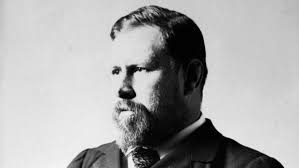Bram Stoker, Dracula, and Progress Studies
The Dracula novel is of course very famous, but it is less well known that it was, among other things, a salvo in the direction of what we now call Progress Studies. Here are a few points of relevance for understanding Bram Stoker and his writings and views:
1. Stoker was Anglo-Irish and favored the late 19th century industrialization of Belfast as a model for Ireland more generally. He also was enamored with the course of progress in the United States, and he wrote a pamphlet about his visit.
2. From Wikipedia:
He was a strong supporter of the Liberal Party and took a keen interest in Irish affairs. As a “philosophical home ruler”, he supported Home Rule for Ireland brought about by peaceful means. He remained an ardent monarchist who believed that Ireland should remain within the British Empire, an entity that he saw as a force for good. He was an admirer of Prime Minister William Ewart Gladstone, whom he knew personally, and supported his plans for Ireland.Stoker believed in progress and took a keen interest in science and science-based medicine.
3. The novel Dracula contrasts the backward world of Transylvania with the advanced world of London, and it shows the vampire cannot survive in the latter. The Count is beaten back by Dr. Van Helsing, who uses science to defeat him and who serves as a stand-in for Stoker and is the de facto hero of the story.
4. One core message of the novel is “Ireland had better develop economically, otherwise we will end up like a bunch of feudal peasants, holding up crosses to fend off evil, rapacious landowners.” At the time, the prominent uses of crosses was associated with Irish Catholicism. And is there a more Irish villain than the absentee landlord, namely Dracula? Dracula is also the kind of warrior nobleman who, coming from England, took over Ireland.
5. In the novel, science and commerce have the potential to defeat underdevelopment. Stoker’s portrait of Transylvania, most prominent in the opening sections of the novel, also suggests that “underdevelopment is a state of mind.” And it is correlated with feuding sects and clans, again a reference to the Ireland of his time, at least as he understood Catholic Ireland. Here is more on Stoker’s views on economic development and modernization for both Ireland and the Balkans.
6. Stoker was obsessed with “rationalizing” (in the Weberian sense) the employment relation and also the bureaucracy His first non-fiction work was “The Duties of Clerks of Petty Sessions.” Progress was more generally a recurring theme in his non-fiction writings, for instance “The Necessity of Political Honesty.” He called for an Ireland of commerce, education, and without “warring feuds.”
7. For Stoker, sexual repression is needed to further societal progress and economic development, and in this regard Stoker anticipates Freud. Dracula abides by most laws and norms, except the sexual/cannibalistic ones. Dracula and Lucy, who give in to their individual desires, end up as the big losers. For the others, societal order is restored, and the lurid sexuality that pervades the book is dampened by the restoration of order.
8. Christ and Dracula are mirror opposites (the stake, the cross, resurrection at dawn rather than sunset, the role of blood drinking reversed, the preaching of immortality in opposite ways, the inversion of who sacrifices for whom, and more). A proper societal outcome is obtained when these two opposites end up neutralizing each other. Stoker’s vision of progress is fundamentally secular. (See Clyde Leatherdale on all this.)
9. From Hollis Robbins: “Britain’s economic prosperity in the nineteenth century was largely dependent on the adoption of international standards such as Greenwich Mean Time and the universal day, which ensured smooth coordination for trade, legal transactions, railroad travel, and mail delivery. Dracula, whose powers are governed by the sun and the moon rather than clocks and calendars, works to destabilize social coordination. His objective is not only literally to “fatten on the blood of the living,”6 but also more broadly to suck the lifeblood of a thriving commercial economy at the dawn of a global age. Under Dracula’s spell, humans forget the time, becoming listless, unproductive, and indifferent to social convention. At heart, the fundamental battle in Stoker’s Dracula is a death struggle between standard time as an institutional basis for world markets and planetary time governing a primitive, superstitious existence.”

10. In an interview Stoker once said: “I suppose that every book of the kind must contain some lesson, but I prefer that readers should find it out for themselves.” There are numerous ways to take that remark, not just what I am suggesting.